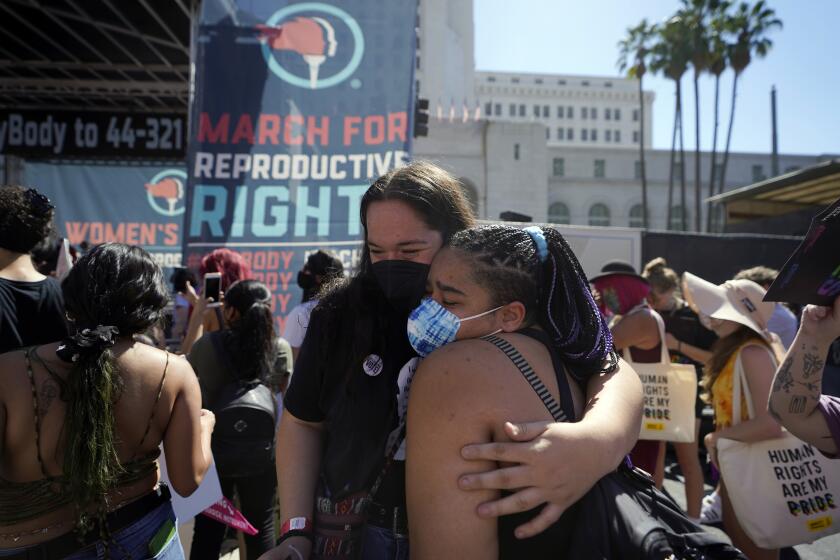The Texas abortion law may have gone too far — even for conservative Supreme Court justices

- Share via
After oral arguments in two cases involving the Texas abortion law Monday morning, it appears that a majority of the justices will rightly say that if a state adopts an unconstitutional law, there must be some way to challenge it in federal court and have it enjoined.
Although it always is dangerous to read the tea leaves of oral arguments to predict results, it seems that even some of the most conservative justices were troubled by the idea that a state could adopt a clearly unconstitutional law that violates the rights of its citizens and be immune from any challenge in federal court. Many of the justices explicitly recognized that the stakes are enormous: Will the United States Constitution remain the supreme law of the land?
While the cases arose in the context of a Texas law that prohibits abortions, the discussion at the oral arguments was about legal doctrines concerning the ability of federal courts to exercise jurisdiction and hear lawsuits. The Texas statute, SB 8, prohibits abortion after a fetal cardiac activity can be detected, about six weeks after a woman’s last menstrual period. No one, including Texas, asserts that this is constitutional. Since Roe vs. Wade, in 1973, women have had the constitutional right to terminate their pregnancies until the fetus is viable, around the 24th week of pregnancy.
One of the lawsuits, Whole Women’s Health vs. Jackson, is brought by reproductive healthcare facilities on behalf of their female patients. The other, United States vs. Texas, is a suit by the federal government to block the Texas law on the grounds that it violates the Constitution.
As some states continue to outlaw abortion, places like California will have to pick up the slack.
The solicitor general of Texas, Judd Stone II, argued to the justices that no Texas state officials can be sued to have the law declared unconstitutional or enjoined because they play no role in enforcing the law. The law is enforced by civil suits brought by private citizens against doctors who perform abortions or those who aid or abet them. Stone argued that the only way to challenge the law is for someone to be sued for violating it and then argue that the law is unconstitutional as a defense in the civil suit. Atty. Gen. Jonathan Mitchell, also representing Texas, maintained at the oral arguments that the United States government has no legal authority to sue and suffers no injury that gives it standing to sue in federal court.
But the justices, including the conservatives, seemed deeply skeptical of Texas’ position. As U.S. Solicitor General Elizabeth Prelogar said in court, the Constitution demands that a federal court have the power to declare a law unconstitutional when it is. Since at least 1908, when the court decided Ex parte Young, it has been clear that a federal court may issue an injunction to halt the enforcement of an unconstitutional state law.
Article VI of the Constitution declares that the Constitution is “the supreme Law of the Land; and the Judges in every State shall be bound thereby, any Thing in the Constitution or Laws of any State to the Contrary notwithstanding.” But if Texas is right, there would little limit on the ability of states to disobey the Constitution.
A particularly important exchange occurred between Justice Brett M. Kavanaugh and Texas Solicitor General Stone. Kavanaugh asked whether a state might use the Texas law as a precedent and adopt laws creating civil liability for those possessing guns or performing same-sex weddings or exercising other constitutional rights, and whether states could set fines in the millions of dollars. Stone admitted under Texas’ theory a state could do this, putting all constitutional rights in jeopardy.
Staff at Texas abortion clinics are surveilled constantly. People eager to sue us send fake patients into our clinics to see if we will break the law.
Justice Sonia Sotomayor in her questions noted that the last time a state so flagrantly violated the Constitution was during the 1950s, when Southern states refused to comply with federal court orders to desegregate their schools. When Arkansas Gov. Orville Faubus attempted to stop the desegregation of the Little Rock schools, the Supreme Court, in Cooper vs. Aaron in 1958, emphatically reaffirmed the supremacy of the Constitution and federal law. The unanimous court, quoting Chief Justice John Marshall, wrote: “If the legislatures of the several states may, at will, annul the judgments of the courts of the United States, and destroy the rights acquired under those judgments, the constitution itself becomes a solemn mockery.”
Although there are at least five justices on the current Supreme Court opposed to abortion rights, the oral arguments indicated that a majority see that these cases are about much more than this specific constitutional right. They are about nothing less than whether every state must follow the Constitution — or whether a state can be permitted to make a mockery of it.
Erwin Chemerinsky is dean of the UC Berkeley School of Law and a contributing writer to Opinion. He is the author most recently of “Presumed Guilty: How the Supreme Court Empowered the Police and Subverted Civil Rights.”
More to Read
A cure for the common opinion
Get thought-provoking perspectives with our weekly newsletter.
You may occasionally receive promotional content from the Los Angeles Times.











